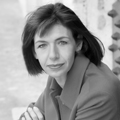Francesca Caferri
Speaker

In her journalistic work, Francesca Caferri covers several topics considering world affairs, specialising in development issues and major international events, with an emphasis on the Middle East. She has worked for different Italian newspapers including Milano Finanza (1998) and Bloomberg Investimenti (1999) where she focused on international economics and finance. From 1999 to 2001, she covered humanitarian and European issues at CNN Italy.
From 2002 to 2006, Caferri was professor of international organisations and foreign affair politics at the ‘Istituto per la Formazione al Giornalismo’ in Urbino, Italy.
Since 2001, she has been taking charge of the world affairs section at La Repubblica in Rome, covering major international events in the Middle East, USA, Africa, Europe, and Latin America. Caferri is vice editor at La Repubblica.
During the last years, she has reported – among other locations – from Sri Lanka during the tsunami crisis (2005), from Lebanon during the Israel war (2006), from Pakistan in the aftermath of Benazir Bhutto’s killing (2007 and 2008), from Iraq for the fifth anniversary of the war (2008), and from Afghanistan in 2009. Caferri has travelled extensively in the Middle East, Asia, and Africa interviewing leading figures in the political and social field (most recently Shimon Peres, David Petraeus, Asif Ali Zardari, Desmond Tutu, Shirin Ebadi, Wangari Maathai, and the Dalai Lama).
In 2005, Caferri was awarded with the highest prize for Italian journalists (the Saint Vincent journalism prize) for reporting from Cuba during the first meeting of the Cuban opposition.
